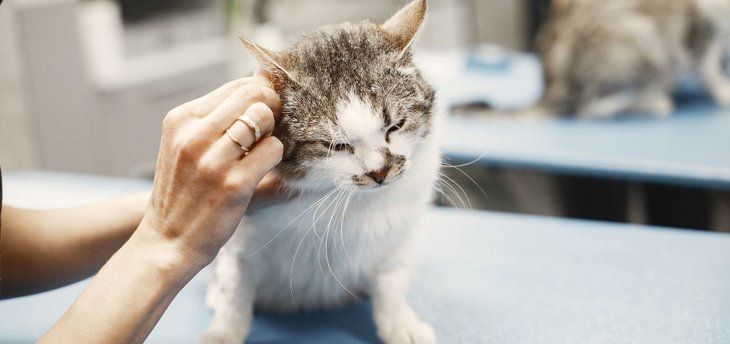Allergies In Cats: Causes & Treatments
One of the most common causes of itchiness in cats is allergies. In fact, cats are almost as prone to allergies as people are. Irritants in the air, chemicals, and foods can cause reactions that affect their skin, eyes, airways, and gastrointestinal system. While some allergic reactions are just irritating for a short period of time, others can end up being fatal.
In this post, we’re discussing allergies in cats, how to determine whether your cat has them, and how you can treat them. Here’s what we’ll cover:
- What are allergies?
- Can cats have allergies?
- Symptoms of allergies in cats
- Common cat allergens
- Types and causes of allergies in cats
- Diagnosing cats with allergies
- The best ways to avoid allergens
- What can I give my cat for allergies?
- Preventing and treating feline asthma
- Tips for keeping cats healthy
What are allergies?
Allergies are among the most prevalent health issues in cats. An allergy develops when the feline's immune system overreacts or becomes hypersensitive to foreign substances known as allergens.
Can cats have allergies?
Yes, cats can develop allergies just like people do. This occurs as a result of their immune systems becoming vulnerable to environmental toxins. These irritating substances might not bother you or the other animals in your home, but when your pet's body works to get rid of the bothersome substances, they may exhibit a variety of symptoms.
Symptoms of allergies in cats
In most cases, a cat with allergy symptoms will have itchy and irritated skin, but between 10% and 15% of affected felines may also experience gastrointestinal symptoms like diarrhea and vomiting. Other common symptoms of allergies in cats include respiratory issues such as coughing, sneezing, and wheezing. There may occasionally be a discharge from the nose or eyes.
Common cat allergens
There are many things a cat can be allergic to, and most are found in our homes:
- Food. A cat may be allergic to many different kinds of food, but the most frequent offenders are animal proteins like beef, chicken, fish, eggs, and dairy.
- Cleaning products, such as disinfecting sprays, floor cleaners, and detergents
- Perfume, strong fragrances, and colognes.
- Specific surfaces. A feline may react negatively to surfaces made of certain fabrics, plastic, or rubber and experience issues with certain beds, food bowls, and floor mats.
- Inhalants, including cigarette smoke as well as other types of smoke.
- Litter box that produces dust can trigger feline asthma attacks, also known as allergic bronchitis.
- Medications, including shampoos, flea remedies, and even vaccines.
- Fleas. Felines who are bitten by fleas experience symptoms like itching, redness, and hair loss. Indoor cats can also have fleas.
- Pollens, including dust, tree, weed, and grass pollens found in your home or backyard.
If you suspect your cat might be allergic, a comprehensive check by your veterinarian or a veterinary dermatologist is advised because cats frequently have several allergies at the same time.
Types and causes of allergies in cats
Feline allergies are typically broken down into three primary categories:
- Food allergies
- Flea allergies
- Environmental allergies
Food allergies in cats
Contrary to popular belief, cat food allergies are not nearly as common as most pet owners think they are. In reality, only 10% of allergic pets have a food allergy, making food the third most common type of allergy in cats.
Felines suffering from food allergies frequently experience:
- Itchy skin and inflammation
- Gastrointestinal symptoms like diarrhea, vomiting, and/or increased gassiness
- Recurrent ear or skin infections
Cats can develop a food allergy at any time, regardless of their age or diet. It's possible for a cat to become allergic to a food or ingredient they had been eating consistently with no adverse reaction.
Flea allergies in cats
Some cats experience severe itching even after only being bitten once or twice because they are allergic to fleas. Felines with flea allergies may lick, bite, or scratch, especially in the areas around the thighs, neck, belly, flanks, and base of the tail.
Using a flea prevention product year-round is the best way to prevent and manage flea allergies. Your vet can recommend a suitable product based on your pet’s individual needs.
Inhalant allergies
Cats can be allergic to environmental allergies such as pollen, mold, dust, dusted litter, covered litter boxes, as well as perfume, cigarette smoke, and cleaning products. These are all products of the environment your pet lives in and could pose health risks to the animal. When possible, try to avoid any products that irritate your cat or aggravate their allergies.
Seasonal allergies
Unlike seasonal allergies in humans, which mainly cause respiratory problems, seasonal allergies in felines usually manifest as atopic dermatitis. A cat is unlikely to get a runny nose, itchy eyes, or watery sinuses. They will instead show skin or throat symptoms and may potentially be sneezing.
Atopic dermatitis
Atopic dermatitis or atopy is a skin condition that cats frequently get as a result of allergies.
Your pet may experience skin sores, hair loss, redness, and scabbing as a result of this illness. Depending on the length of the cat's allergy season, atopy can be treated with corticosteroids, antihistamines, and immunosuppressive drug therapy, as well as improving the health of the hair and skin coat using shampoos, sprays, and/or spot-ons.
Contact allergies
When a cat comes into contact with an allergic substance, contact allergies cause a localized reaction on the skin. Reactions to shampoos, flea collars, or particular kinds of bedding, such as wool, are a few examples. If the feline is allergic to these compounds, there will be skin rashes and itching where the substances come into contact. The issue is resolved by getting rid of the contact irritant.

Diagnosing allergies in cats
Determining what a cat is allergic to can be challenging. If the trigger isn't clear, elimination diets and exclusion trials with various food dishes, cleaning products, medications, and beds may be required in order to figure out what produces an allergic reaction. There are also certain blood and skin tests available to identify specific allergens.
The best way to avoid cat allergies
There is no way for cats to avoid allergens altogether, but you can take certain steps to reduce your pet’s exposure to them:
- Use prescription flea control, choose dust-free, unscented cat litter, and maintain a clean environment.
- Avoid using too many deodorants or fragrances, as well as smoking within the house.
- Give your feline friend stainless steel water and food bowls to help prevent your cat from developing dermatitis or facial acne while limiting their exposure to bacteria.
- Change your HVAC filters once a month.
- Vacuum and dust frequently.
- If your cat suffers from seasonal allergies, keep them outside when the pollen count is high.
If your cat exhibits allergy symptoms, be sure to visit your vet.
What can I give my cat for allergies?
There are a number of different medications available to treat allergies in cats. Some of the most common ones include steroidal medications, antihistamines, and prescription flea control, as well as lotions, ointments, eye drops, and ear drops.
Always consult your veterinarian before giving a new medication to your pet to ensure the appropriate dose and drug is administered.
Treatment for cats with allergies
Allergies cannot be entirely cured, but they can be dealt with. Following are a few different allergy-specific treatment plans.
- Cat food allergies. Your pet must follow a rigorous diet consisting of foods you are confident will not trigger allergy symptoms for at least two months. In most cases, that means that leftovers from meals, treats, and even flavored medications are forbidden. Your veterinarian can assist you in locating substitute medications and hypoallergenic food that might be more tolerable.
- Flea allergies. Flea control products are the best way to manage flea allergies. Do not use flea products intended for dogs, as they can be toxic to felines. Talk to your veterinarian about the best flea control for your pet.
- Environmental allergies: Environmental allergies are more difficult to manage. Depending on their symptoms' severity, cats with atopy or seasonal allergies may require long-term therapies and drugs that are given regularly or only when an attack occurs. Desensitization therapy is another option to explore if your pet has environmental allergies. This entails once-a-week injections that are personalized for your feline friend based on an allergy test. Your pet's allergies are present in trace concentrations in the injections, which allows your cat to gradually develop a tolerance. The drawbacks are that it can take months to years for it to start working and that not all cats will see a noticeable difference. However, it might be worth a shot for cats with severe symptoms.
Natural remedies for cat allergies
Some home remedies for feline allergies referenced on the internet include:
- Giving pine bark orally as a supplement.
- Adding a small spoonful of fish oil at each feeding
- Giving medicinal mushrooms like maitake, reishi, shitake, and turkey tail.
Disclaimer: Many of these home remedies are pet care myths with no scientific backing. If you think your cat is allergic to something, be sure to talk to your veterinarian.
Preventing and treating feline asthma
Asthma is a disease of the lower airways which affects up to 5% of cats. Although there is some disagreement over what causes cat asthma, the majority of experts agree that it is brought on by an allergic reaction to something the animal inhales.
Allergies are more common in cats with asthma. If your cat suffers from both asthma and allergies, your vet will probably recommend medications that temporarily widen your cat's airways. Corticosteroids and other drugs like them may be used in long-term therapies.
Tips for keeping your cat healthy
Dealing with allergies in cats can be quite difficult, especially if the allergen is impossible to get rid of such as dust or pollen. Some cats can be kept more comfortable with medicine and may only experience symptoms during certain times of the year.
Some pet insurance plans cover allergy shots and medication that are prescribed by a vet. However, if allergies are considered pre-existing, allergy medications will most likely be excluded from coverage, so be sure to sign up your feline while they are still young and healthy.
Key Takeaways
- Allergies are an overreaction of the immune system. A cat with allergy symptoms will exhibit itchiness, red skin, ear infections, vomiting, diarrhea, etc.
- The most common allergies in cats are environmental allergies, flea allergies, food allergies, and contact allergies.
- Allergies can't be cured, but they can be contained and dealt with. There is also no way to prevent a cat from developing allergies, but limiting their exposure to allergens can be helpful.
Do you want to find the best pet insurance?
Let's analyze your pet's breed, age, and location to find the right coverage and the best savings. Ready?
Analyze My PetAbout Pawlicy Advisor
The pet insurance marketplace endorsed by veterinarians, at Pawlicy Advisor we make buying the best pet insurance easier. By comparing personalized coverage and pricing differences we can save you a ton of money, up to 83% in some instances!
Instantly Compare Pet Insurance Plans
Guides
Determine If Pet Insurance Is Worth It
Comparison Charts
Find Your State
Dog Insurance
Small Animal Relief Veterinarian
Lila Batiari, DVM is a relief veterinarian located in San Diego, California. She has a special interest in nutrition, pain management, and surgery! Dr. Batiari enjoys working with Pawlicy Advisor to help others avoid everyday situations that some of her clientele experience. She realizes that expensive vet bills for treatment costs could be much easier for patients with pet insurance.
